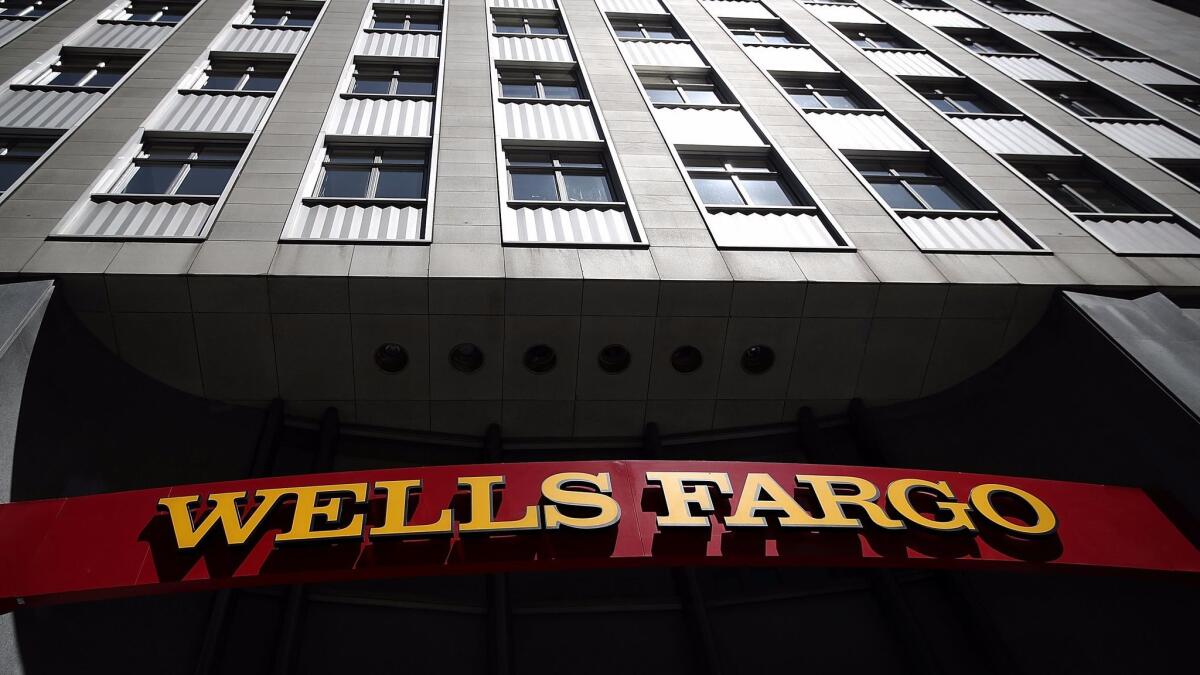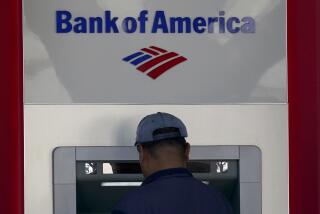Wells Fargo says number of unauthorized accounts, legal expenses could rise

Wells Fargo & Co.’s troubles continue to mount, with a bevy of new disclosures Friday: The bank may have created more unauthorized accounts than first thought, it is the subject of a new federal inquiry and it could face $1.3 billion more in legal costs than previously estimated.
In its latest quarterly filing with the Securities and Exchange Commission, the San Francisco bank acknowledged that a review of accounts created as far back as 2009 “may lead to a significant increase in the identified number of potentially unauthorized accounts.”
The bank’s only estimate of the number of accounts that may have been created without customers’ consent is 2.1 million, a number released last September when Wells Fargo agreed to pay $185 million to regulators over the practice.
But that number was based on a review of accounts created between mid-2011 and mid-2015, and the bank had pledged to expand that review to go back to 2009 and forward to mid-2016. That review is now wrapping up, prompting the announcement that the number of potentially unauthorized accounts may grow.
The bank this spring acknowledged that unauthorized accounts may have been created as long ago as 2002, but it is not conducting an active inquiry that goes back that far. However, attorneys who negotiated a $142-million class-action settlement with the bank over the practice estimated several months ago that the total number of unauthorized accounts created over the past 15 years may be more like 3.5 million.
The bank said in its filing that it does not expect any added cost of refunds or other remediation will have a significant impact on the company’s bottom line. The review is expected to be completed by the end of next month.
Even so, the bank said it was increasing its potential losses related to various legal proceedings and investigations to $3.3 billion — up from $2 billion in its last quarterly filing.
On a conference call with investors last month, Wells Fargo Chief Financial Officer John Shrewsberry said the bank was increasing the figure because of a “variety of matters,” including an ongoing investigation by the Department of Justice and several state agencies into mortgage practices.
The bank on Friday put one legal matter to rest, announcing a $108-million payment to the federal government to settle decade-old allegations that it charged improper fees on home loans to veterans — and improperly collected government payments when some of those loans went bad.
The deal settles a lawsuit first brought against Wells Fargo and other big banks in 2006 by a pair of mortgage brokers in Atlanta. Most other lenders, including JPMorgan Chase, Countrywide and Citi settled in 2012.
“Wells Fargo decided to mount a ‘Stalingrad defense,’ denying the undeniable, and fought for almost five years after the other banks settled,” said James Butler, one of the attorneys for the mortgage brokers.
Butler’s clients alleged that Wells Fargo charged improper fees to veterans who took out government-backed mortgage refinancing loans. Those fees should have nullified the government guarantee behind the loans, but the bank still collected guarantee payments on loans that went bad, the brokers claimed.
Wells Fargo did not admit to any of the allegations. In a statement announcing the deal, Wells Fargo Chief Executive Tim Sloan noted the bank previously settled a suit brought by veterans, agreeing to compensate them for any improper fees they may have paid.
“Settling this longstanding lawsuit allows us to put the matter behind us and continue to focus on serving customers and rebuilding trust with our stakeholders,” Sloan said in Friday’s statement.
The company also acknowledged Friday that it is under investigation by the Consumer Financial Protection Bureau over allegations that it improperly charged mortgage borrowers for fees that the bank should have covered.
Reports surfaced early this year that the bank, and offices in Southern California in particular, would force borrowers to pay fees associated with delays in mortgage applications, even when the delays were the bank’s fault. Last month, a former mortgage banker in Beverly Hills sued the bank, saying he was fired for reporting that practice.
Bank spokesman Kurt Schroeder said the bank is reviewing its practices related to those fees, called rate-lock extension fees.
Wells Fargo shares fell 1% to close at $52.84 Friday. Bank stocks generally were higher for the day, with the benchmark KBW-Nasdaq bank index climbing 1%.
Follow me: @jrkoren
More to Read
Inside the business of entertainment
The Wide Shot brings you news, analysis and insights on everything from streaming wars to production — and what it all means for the future.
You may occasionally receive promotional content from the Los Angeles Times.











